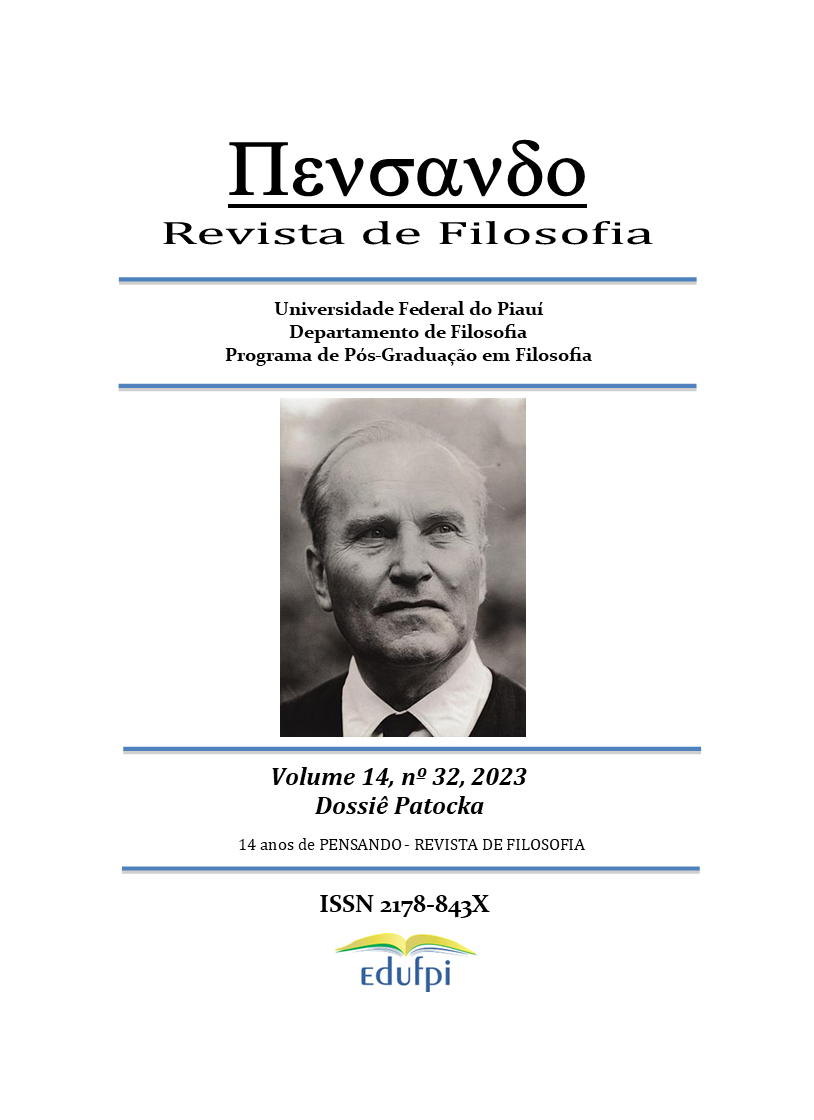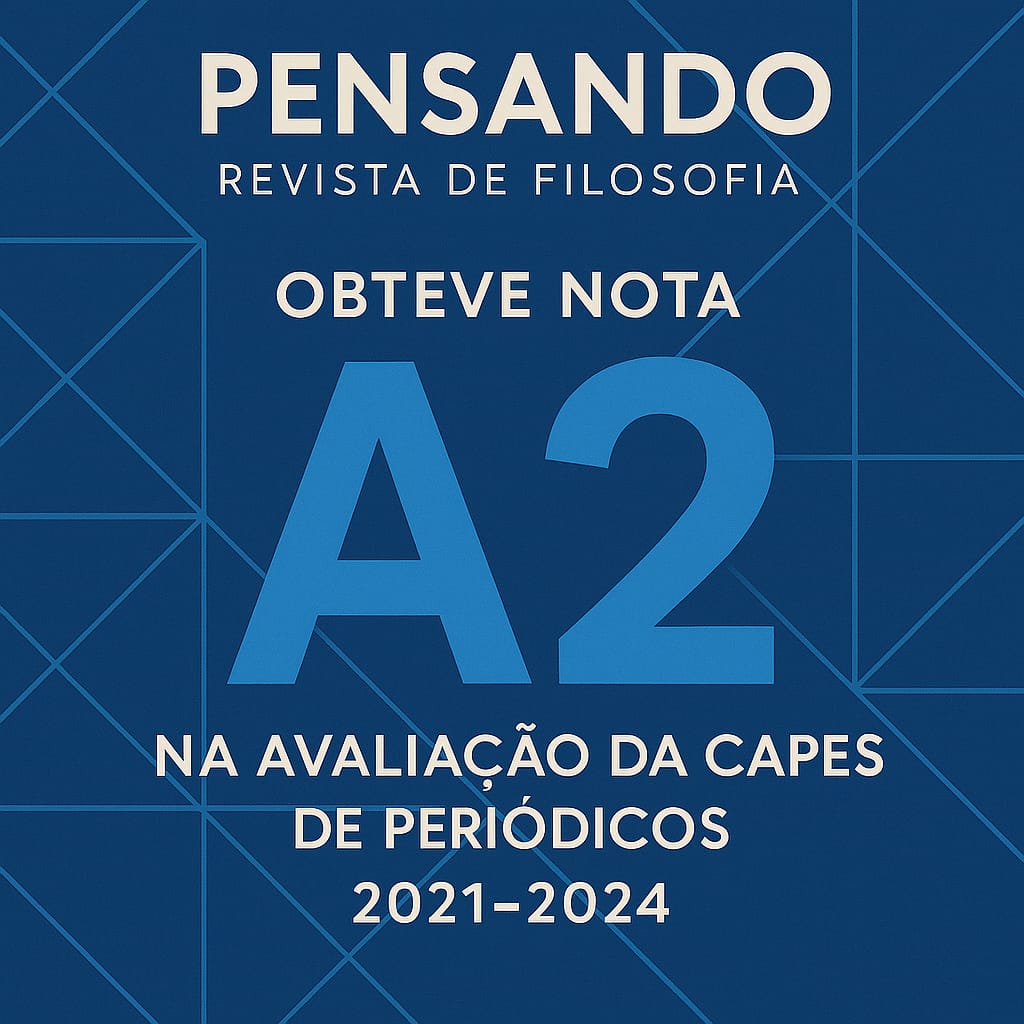From "I" to "Us"
The development of shared intentionality and of objective thought
DOI:
https://doi.org/10.26694/pensando.vol14i32.4256Keywords:
shared intentionality, interaction, Michael TomazelloAbstract
The aim of this article is to present how Michael Tomasello explains the development of shared intentionality and its consequences in the organization of human life and in the development of objective thought in the light of the theory of evolution. In the first part of the article, the formation of shared intentionality will be addressed, both from the point of view of the individual and from the point of view of the species. Subsequently, we will note how this ability allows for the development of the ability for “mindreading” and the ability to metarepresention. These skills allow us to assign intentions to others and see the world from another individual's perspective. Finally, we will observe that the development of these skills enabled the development of objective thinking, expanded the complexity of existing human capacities (such as language) and enabled new and high forms of sociability and organization, with the development of culture and morals.
References
ABRANTES, Paulo C. A psicologia de senso comum em cenários para a evolução humana. Manuscrito – Rev. Int. Fil., Campinas, v. 29, n. 1, p. 185-257, jan.-jun. 2006. Disponível em: <https://periodicos.sbu.unicamp.br/ojs/index.php/manuscrito/article/view/8643682/11198>. Acesso em: 15 nov. 2019.
ABRANTES, Paulo C. Evolução humana: estudos filosóficos. Rev. Filos. Aurora, Curitiba, v. 25, n. 36, p. 75-105, jan./-jun. 2013. Disponível em: <https://periodicos.pucpr.br/index.php/aurora/article/view/583/514>. Acesso em: 11 Nov. 2019.
ABRANTES, Paulo C. Natureza e cultura. Ciência & Ambiente, Santa Maria, n. 48, p. 7-21, jan./jun. 2014. Disponível em: <https://repositorio.unb.br/handle/10482/19403>. Acesso em: 11 Nov 2019.
ABRANTES, Paulo C. Uma mente embebida na cultura. Revista de Filosofia Moderna e Contemporânea, Brasília, v. 6, n.1, p. 9-48, jul. 2018. Disponível em: <http://periodicos.unb.br/index.php/fmc/article/view/18649/20240>. Acesso em: 10 mar. 2019.
DAVIDSON, Donald. Rational Animals. In: DAVIDSON, Donald. Subjective, Intersubjective, Objective. Oxford: Clarendon Press, 2001. p. 95-105.
DAVIDSON, Donald. Three Varieties of Knowledge. In: DAVIDSON, Donald. Subjective, Intersubjective, Objective. Oxford: Clarendon Press, 2001. p. 205-220.
DAVIDSON, Donald. The Problem of Objectivity. In: DAVIDSON, Donald. Problems of Rationality. Oxford: Clarendon Press, 2004. p. 3-18.
DENNETT, Daniel C. Intentional systems in cognitive ethology: the “panglossian paradigm” defended. Behavioural and Brain Sciences, v. 6, p. 343-90, 1983. Disponível em: <https://ase.tufts.edu/cogstud/dennett/papers/Intentionalsystems1983.pdf>. Acesso em: 10 Out. 2019.
DENNETT, Daniel C. Making Tools for Thinking. In: SPERBER, Dan (Ed.). Metarepresentations: a multidisciplinary perspective. New York: Oxford University Press, 2000. p. 17-29.
DUNBAR, Robin. Culture, honesty and the freerider problem. In: DUNBAR, Robin; KNIGHT, Chris; POWER, Camilla (ed.). The evolution of culture: An interdisciplinary view. New Brunswick: Rutgers University Press, 1999. p. 194-213.
DUNBAR, Robin. On the origin of the human mind. In: CARRUTHERS, Peter; CHAMBERLAIN, Andrew (Eds). Evolution and the human mind: modularity, language and meta-cognition. Cambridge: Cambridge University Press, 2000. p. 238-253.
EVERETT, Daniel L. How language began: the history of humanity’s greatest invention. New York: Liveright Publishing Corporation, 2017.
GREENE, Joshua. Moral Tribes: emotion, reason and the gap between us and them. New York: The Penguin Press, 2013.
MAMELI, Matteo. Modules and Mindreaders. Biology and Philosophy, Netherlands, v. 16, n. 3, p. 377–393, 2001. Disponível em: <https://link.springer.com/article/10.1023%2FA%3A1010605410437>. Acesso em: 10 Nov. 2019.
MAMELI, Matteo. Mindreading, Mindshaping, and Evolution. Biology and Philosophy, Netherlands, v. 16, n. 3, p. 597-628, 2001. Disponível em: <https://link.springer.com/article/10.1023%2FA%3A1012203830990>. Acesso em: 10 Nov. 2019.
MERCIER, Hugo; SPERBER, Dan. Why do humans reason? Arguments for an argumentative theory. Behavioral and Brain Sciences. v. 34, 2011, p. 57-111. Disponível em: <https://www.dan.sperber.fr/wp-content/uploads/2009/10/MercierSperberWhydohumansreason.pdf>. Acesso em: 26 Fev. 2019.
MERCIER, Hugo; SPERBER, Dan. Reasoning as a social competence. In: H. Landemore, H.; Elster, J. (eds.). Collective Wisdom: Principles and Mechanisms. Cambridge: Cambridge University Press, 2012. p. 368-392. Disponível em: <http://www.dan.sperber.fr/wp-content/uploads/2012_mercier_reasoning-as-a-social-competence.pdf>. Acesso em: 25 Dez. 2019.
MERCIER, Hugo; SPERBER, Dan. The Enigma of Reason. Cambridge, Massachusetts, 2017.
NAGEL, Thomas. The view from nowhere. New York: Oxford University Press, 1989.
ORIGGI, Gloria; SPERBER, Dan. Evolution, communication and the function of language. In: CARRUTHERS, Peter; CHAMBERLAIN, Andrew (Eds). Evolution and the human mind: modularity, language and meta-cognition. Cambridge: Cambridge University Press, 2000. p. 140-169.
SPERBER, Dan. Metarepresentations in an Evolutionary Perspective. In: SPERBER, Dan (Ed.). Metarepresentations: a multidisciplinary perspective. New York: Oxford University Press, 2000. p. 117-137.
STERELNY, Kim. Thought in a Hostile World: The Evolution of Human Cognition. Malden: Blackwell Publishing, 2003.
TOMASELLO, Michael. The cultural origins of human cognition. London: Harvard University Press, 1999.
TOMASELLO, Michael. Origins of human communication. Cambridge: The MIT Press, 2008.
TOMASELLO, Michael. A natural history of human thinking. Cambridge, London: Harvard University Press, 2014.
TOMASELLO, Michael. A natural history of human morality. Cambridge, London: Harvard University Press, 2016.
TOMASELLO, Michael. Commentary on Philip Pettit’s The Birth of Ethics. In: PETTIT, Philip. The birth of ethics: reconstructing the role and nature of morality. New York: Oxford University Press, 2018. p. 333-346.
TOMASELLO, Michael. How children come to understand false beliefs: A shared intentionality account. Proceedings of the National Academy of Sciences, v. 115, n. 34, p. 8491-8498. Agosto 2018. Disponível em: <https://www.pnas.org/content/pnas/115/34/8491.full.pdf>. Acesso em: 14 nov. 2019.
TOMASELLO, Michael. Becoming human: A theory of ontogeny. Cambridge, London: Harvard University Press, 2019. Livro eletrônico.
TOMASELLO, Michael. The role of roles in uniquely human cognition and sociality. J Theory Soc Behav, Early View, p. 1-18, 2019. Disponível em: <https://onlinelibrary.wiley.com/doi/epdf/10.1111/jtsb.12223>. Acesso em: 20 nov. 2019.
TOMASELLO, Michael; GONZALEZ-CABRERA, Ivan. The Role of Ontogeny in the Evolution of Human Cooperation. Human Nature, v. 28, n. 3, p. 274-288, Setembro 2017. Disponível em: <https://link.springer.com/article/10.1007%2Fs12110-017-9291-1>. Acesso em: 04 Ago. 2018.
TOMASELLO, Michael; KRUGER, Ann Caie; RATNER, Hillary Horn. Cultural learning. Behavioral and Brain Sciences, v. 16, p. 495-552, 1993. Disponível em: <https://www.researchgate.net/publication/231950897_Cultural_Learning/link/0f317537fc34a2765b000000/download>. Acesso em: 31 Out. 2019.
TUGENDHAT, Ernst. Wittgenstein II: a saída da campânula. Novos Estudos CEBRAP, n. 33, p. 249-266, julho de 1992. Disponível em: <http://novosestudos.uol.com.br/produto/edicao-33/>. Acesso em: 18 Nov. 2017.
TUGENDHAT, Ernst. Wittgenstein II: der Ausweg aus dem Fliegenglas. In: TUGENDHAT, Ernst. Selbstbewusstsein und Selbstbestimmung: Sprachanalytische Interpretationen. Frankfurt am Main: Suhrkamp, 1997. p. 114-136.
WITTGENSTEIN, Ludwig. Philosophische Untersuchung; Philosophical Investigations. Malden: Blackwell Publishers, 1999. Edição bilíngue.
Published
How to Cite
Issue
Section
License
Copyright (c) 2023 PENSANDO - REVISTA DE FILOSOFIA

This work is licensed under a Creative Commons Attribution 4.0 International License.

























